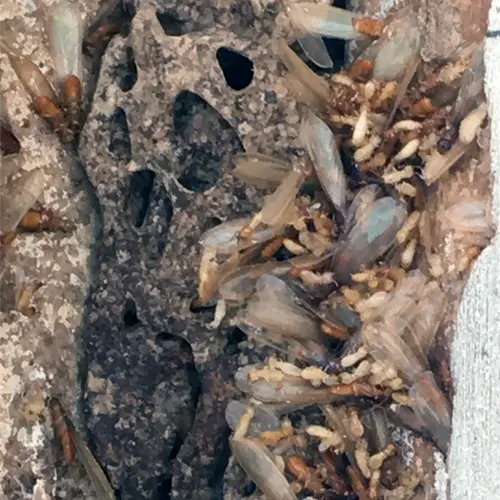Understanding Termites in Florida
Florida’s warm, humid climate makes it a haven for many things: beautiful beaches, lush landscapes, and also termites. These tiny pests, often referred to as the “silent destroyers,” can cause significant damage to homes and buildings if left unchecked. In this blog, we’ll explore the types of termites in Florida, the signs of an infestation, preventive measures, and treatment options to protect your property.

Different Types of Termites in Florida
Florida is home to several species of termites, each with their own unique characteristics and behaviors:
- Subterranean Termites: The most common and destructive type in Florida. They live in colonies underground and build mud tubes to access food sources above ground.
- Drywood Termites: Unlike subterranean termites, drywood termites do not require contact with soil. They infest dry wood and can create extensive damage within wooden structures.
- Dampwood Termites: These termites prefer moist, decaying wood. While less common in homes, they can still cause significant issues in properties with poor drainage or leaks.
- Formosan Termites: Known for their aggressive nature and large colonies, Formosan termites can cause extensive damage rapidly. They are a subtype of subterranean termites but are more destructive due to their sheer numbers and aggressive foraging.
Signs of Termite Infestation
Detecting a termite infestation early is crucial to prevent significant damage. Here are some common signs to look out for:
- Mud Tubes: Subterranean termites build mud tubes to travel between their colony and food sources. These tubes are often found on walls, foundations, or crawl spaces.
- Discarded Wings: After swarming, termites shed their wings. Finding piles of discarded wings near windowsills, doors, or light sources can indicate an infestation.
- Wood Damage: Termites consume wood from the inside out, leaving a honeycomb pattern. Tapping on wood and hearing a hollow sound or noticing blistering paint can be a sign of termite damage.
- Frass: Drywood termites produce frass, a sawdust-like material that they push out of their galleries. Finding small piles of frass can indicate their presence.
Preventive Measures
Preventing a termite infestation involves a combination of property maintenance and proactive measures:
- Reduce Moisture: Fix leaky pipes, ensure proper drainage, and use dehumidifiers in damp areas. Termites thrive in moist environments, so keeping your property dry is essential.
- Seal Entry Points: Inspect your home for cracks in the foundation, gaps around utility lines, and other potential entry points. Seal these with caulk or other appropriate materials.
- Maintain Wood: Keep wood, lumber, and paper away from your foundation. Store firewood at least 20 feet away from your home, and inspect wooden structures regularly for signs of damage.
- Regular Inspections: Schedule regular termite inspections with a licensed pest control professional. Early detection can save you from costly repairs in the future.
Treatment Options
If you think you might have a termite infestation, it’s very important to act quickly. Here are some of the most common treatment options:
- Liquid Termiticides: Applied around the foundation, these chemicals create a barrier that termites cannot cross. It’s a common method for subterranean termite control.
- Bait Systems: Bait stations are placed around your property to attract termites. Once they feed on the bait and return to their colony, they spread the toxic substance, eventually killing the colony.
- Localized Treatments: For minor infestations, localized treatments such as spot treatments with termiticides or heat treatments can be effective.
Conclusion
Termites in Florida can have a significan impact and can be devastating if not managed properly. Understanding the types of termites common in Florida, recognizing the signs of an infestation, and taking preventive measures can help protect your home or business. Regular inspections and treatment are key to keeping these silent invaders at bay.
If you suspect a termite problem, don’t hesitate to contact Hannan Environmental Services or click here for a FREE no-obligation quote today! You can also learn more about Hannan on Facebook.

